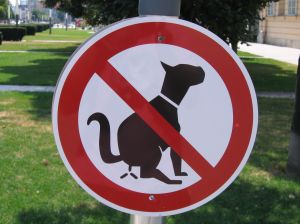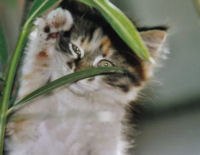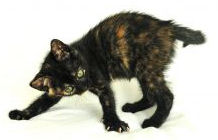 |
 |
 If
you are considering adding a life-long companion to your family this
holiday season, you might consider giving one of the thousands of
animals waiting for homes in your local shelters. From puppies and
kittens to older pets, there is always a variety to choose from. If
you are considering adding a life-long companion to your family this
holiday season, you might consider giving one of the thousands of
animals waiting for homes in your local shelters. From puppies and
kittens to older pets, there is always a variety to choose from.
Before
you venture into one of these facilities, do a bit of research on
different breeds, their special personalities and energy levels.
- Will there be someone home most of the day or is your family on the go with work and school most of the week?
- Do you
have a safe outdoor area for exercise and fresh air or will your new
friend be left inside and alone for a majority of the day?
- What kind of outdoor activities do you like to do and will you want a companion on the hiking trails?
- If you have children, how old are they and will they want to take part in caring for the new dog or cat?
- Do you want to housebreak a puppy or kitten - or would an older, better trained adult be better.
These
are just a few of the questions that you need to ask before deciding
whether to go for a high-energy or a laid-back personality.
You
will most likely have a variety of pure or mixed breeds to choose from.
And if you have done some research you will be able to identify the
personality traits of either and narrow your list to a few lucky dogs
that might become your forever-friend!
There are many resources that you can tap into to help you with this important decision. Click Here
to read more on adopting a dog or puppy from a shelter. If you are
thinking about adding a cat to your family you can find some helpful
information at the LiveScience site.
|
|
 |
 |
According to the American Pet Products Manufacturers
Association (APPMA) there are 74.8 million dogs in the United States.
And you know what that means: lots of
dog poop. The biggest carbon footprint of man's best friend is their
poop. All that pooping and scooping has left a mountain of plastic
bags that will be around for oh, the next million years or so.

So
how do you green up dog doo? Well, you can start by losing the plastic
bags that you're using to scoop the poop into. And unless you're going
to compost, those corn-based biodegradable dog waste bags aren't
necessarily the best option either. Bio-bags need constant exposure to
oxygen to start the decomposition process. They will only work if your
city doesn't bury its waste lower than 15 feet -- the level where
oxygen begins depleting.
Although not as convenient as plastic,
newspaper and paper bags are at least going to decompose. You may want
to supplement the paper with a product like Skooperbox. These
all-in-one boxes (scooper, container, carrier) are made with 100%
recycled material that is portable, durable, and biodegradable.
If you really want to go all out, you can purchase (or make, if you're feeling industrious), a Doggie Dooley
compost system. The process is simple: dig a hole, drop in the poo,
then add water and digester powder and let the miniature septic tank
system work its magic. You can use the corn based bio-bags in these
systems, which you can find at most large pet stores.
|
|
 |
 |
|

Most pet owners don't realize it, but pets are exposed to more hazards
during the holidays than any other time of the year. Here are some tips
for keeping your pets safe this holiday season.
- Holiday treats, alcoholic beverages, scraps and bones can be
harmful or toxic to pets. Keep your pets on a regular diet and caution
visitors against giving them human food.
- Keep all candies and their wrappers put away. Foil wrappers can be like razors if ingested.
- Supervise all candles - pets are attracted to the bright flickering flames.
- Decorations should be carefully placed so pets can't swallow small pieces.
- Cover or tack down electrical cords.
- Don't give your pet large quantities of turkey or ham during the
holidays. Overfeeding of human food can cause health problems and
unsatisfactory eating and begging habits.
- Never feed pets bones, especially poultry bones. Each year
thousands of pets are treated for consumption of splintered bones, a
potentially fatal condition.
- Don't feed pets drippings. Human seasonings aren't good for pets, and the rich stock can easily upset their digestive systems.
- Remember
that many holiday lights have moderate to lethal toxicity, depending on
the amount of fluid (methylene chloride) ingested.
- Don't decorate with angelhair (spun glass) as it can cause irritation of the eyes, skin and gastrointestinal tract.
- Artificial snow and snow flock can cause toxicity from inhalation if sprayed in the mouth.
- Hang
valuable ornaments high on the Christmas tree. Use wooden, medal, or
resin-cast on the lower branch ornaments. Tinsel isn't toxic, but if
ingested, it could cause choking and/or intestinal obstruction.
- Avoid tying ribbons around pets necks and keep ribbons and bows put away to prevent pets from eating them.
- Replace metal ornament hooks with tightly knotted 1/4 inch ribbons of light-weight twine or yarn.
- Increased activity and visitors during the holiday season can upset
your pet's routine. Try to keep them on their regular routines, and
always give lots of love!
|
|
 |
|
telephone: 9561 2438
fax: 9561 1634
email: yanchepvet@live.com
We
are located at 4 Glenrothes Crescent, in the light industrial area of
Yanchep. Just in behind the planet nursery and the hardware store,
right next door to the fire station.
|
|
|
 |
|
In This Issue:
|
|
 |
|
contact us
|
telephone: 9561 2438
fax: 9561 1634
email: yanchepvet@live.com
|

|
|
Just for Fun!
|
|

Our pets communicate with us in very special ways - we find ways to understand one another!
Click Image to watch a short video of a kitty wanting just a couple more minutes to sleep!
|

|
|
Fun Pet Facts
|
|
95% of cat owners admit they talk to their cats.

A cat will clean itself with paw and tongue after a dangerous
experience or when it has fought with another cat. This is believed to
be an attempt by the animal to soothe its nerves by doing something
natural and instinctive.

Dogs' eyes have large pupils and a wide field of vision, making them
really good at following moving objects. Dogs also see well in fairly
low light.

It has been established that people who own pets live longer, have less stress, and have fewer heart attacks.

SAD FACT!
Each day in the US, animal shelters are forced to destroy 30,000 dogs and cats.
|
|
 |